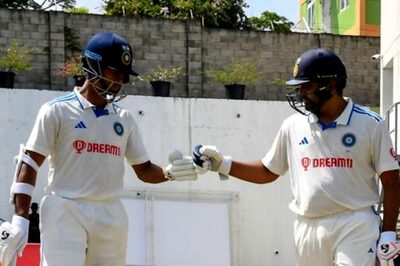
views
Beirut: The United States has called for a new regime of tolerance and freedom in Syria as forces loyal to President Bashar al-Assad battled fighters infiltrating the country to join the growing rebel army trying to overthrow him.
Speaking after meeting members of the opposition Syrian National Council in Geneva, US Secretary of State Hillary Clinton said Syrians must not only remove Assad but also advance towards the rule of law.
"A democratic transition includes more than removing the Assad regime," Clinton said. "It means setting Syria on the path of the rule of law and protecting the universal rights of all citizens, regardless of sect or ethnicity or gender."
What began nearly nine months ago as a peaceful protest against Assad, inspired by the Arab Spring in Tunisia and Egypt, is creeping closer to civil war as armed opposition groups organise and move into some city districts.
The United States, the European Union, Turkey and Jordan have called on Assad to step down in order to bring the violence to an end and permit democratic elections for a new government in a country where the Assad family has ruled for 40 years.
Washington said on Tuesday it was sending ambassador Robert Ford back to Damascus six weeks after he was withdrawn for safety reasons. Ford had angered Syrian officials with his public displays of support for protesters.
Clinton said the opposition understood that Syrian minorities needed to be reassured they would be better off "under a regime of tolerance and freedom". Assad is a member of the Alawite minority sect, an offshoot of Shi'ite Islam, while most Syrians are Sunni Muslims.
On Tuesday, the official Syrian news agency SANA reported that Syrian border guards blocked an infiltration attempt from Turkey by about 35 "armed terrorists".
It said some of those who came over the border were wounded and escaped back to Turkey where they received aid from the Turkish army. The wounded were transported in Turkish military vehicles, SANA said.
"The border guards forces suffered no injuries or losses. They warned they would stop anyone who even thinks of touching Syria's security or its citizens," SANA said.
Relations between Syria and Turkey have disintegrated since Syria began using force to suppress the revolt. Turkey has said a buffer zone may be required on its 900-km (560-mile) border with Syria if the violence causes a mass exodus of Syrians.
Assad still has significant support in Syria despite nearly nine months of unrest in which more than 4,000 people have been killed, according to the United Nations. Many Syrians have not taken sides, fearing chaos or sectarian war.
The Syrian National Council has urged the three-month-old Free Syrian Army of defectors to limit itself to protecting civilians and not take the offensive against state security.
But the rebel force is attacking army convoys and bases.
On Tuesday, clashes erupted between army defectors and security forces in the town of Dael in southern Deraa province, the activist Syrian Observatory for Human Rights said.
"There were raids and arrests ... and random gunfire and stun grenades exploding to terrify the people," it said. All telephone lines and mobile phone connections were cut off.
The Syrian news agency earlier reported the funerals of seven army and police members killed in fighting with armed rebels. Syria says the latter are "terrorists" organised and financed from abroad.
Diplomacy stalling
Diplomatic efforts to resolve the crisis have stalled and Syria is now the target of international economic sanctions and a travel ban on senior officials.
Syria has said it may sign up to a peace plan by the 22-state Arab League which calls for forces to be withdrawn to barracks and Arab observers allowed into the country.
But it says, as a precondition, the Arab League would have to revoke economic sanctions it imposed earlier this month and unblock Syria's frozen membership of the League.
The US State Department said ambassador Ford was returning to Damascus after completing consultations in Washington.
Ford had antagonised Syria's government with his high-profile support for anti-Assad demonstrators. Assad's supporters had attacked the US embassy and Ford's convoy.
Clinton was meeting Syrian National Council leader Burhan Ghalioun, who has said the a post-Assad Syria would align itself with the Arab League and the Gulf, and end its special relationship with Iran and the Lebanese movement Hezbollah.




















Comments
0 comment